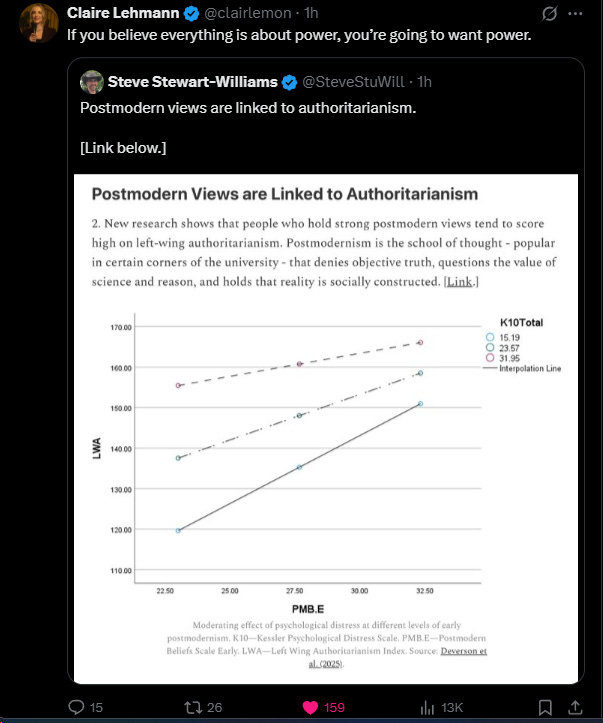The Power Trap
How Postmodern Beliefs Could Feed Authoritarianism
Recently, a discussion emerged online following a tweet from Steve Stewart-Williams summarizing new research linking postmodern views with authoritarianism. Claire Lehmann further highlighted the implications succinctly, stating: "If you believe everything is about power, you’re going to want power."
The cited study by Deverson et al. (2025) demonstrates a statistically significant correlation between individuals who embrace postmodern beliefs—characterized by skepticism toward objective truth, reason, and scientific inquiry—and higher scores on measures of left-wing authoritarianism (LWA). The authors suggest postmodernism's emphasis on viewing reality as socially constructed and structured by power dynamics could predispose individuals to authoritarian methods as legitimate tools for social change.
However, correlation is not causation. Several alternative explanations may account for these findings:
Shared Psychological Traits: Individuals drawn to postmodern perspectives and authoritarianism might possess common personality features, such as high neuroticism or low openness to differing viewpoints. Both ideologies could independently appeal to those seeking cognitive or emotional security.
Social and Academic Environments: Institutional cultures, especially in universities, could simultaneously encourage conformity to both postmodern ideology and authoritarian social norms, influencing participants to adopt both sets of beliefs through peer pressure and social signaling.
Epistemic Vacuum and Moral Certainty: The relativism inherent in postmodernism could leave individuals craving moral and epistemic certainty. Authoritarian ideologies, which often provide clear moral frameworks, might thus become attractive solutions to cognitive dissonance.
Identity and Group Dynamics: Postmodernism’s focus on power dynamics and marginalized identities might lead individuals to authoritarian approaches as protective strategies. Authoritarian methods might appear justified as necessary reactions to perceived threats or injustices.
Methodological Factors: The correlation could be inflated by overlapping constructs in survey measurement or by participants' desire for ideological consistency, skewing responses toward coherent ideological positions.
Reverse Causation: Pre-existing authoritarian inclinations might drive individuals to selectively adopt postmodern beliefs to rationalize their pursuit or justification of power-driven methodologies.
Future research can clarify these potential explanations through longitudinal studies, nuanced personality assessments, and qualitative analyses of ideological adoption. Understanding the complexities behind these correlations is crucial—while recognizing Lehmann’s insight about power dynamics, we should approach conclusions cautiously, mindful that correlation alone does not establish definitive causation.



